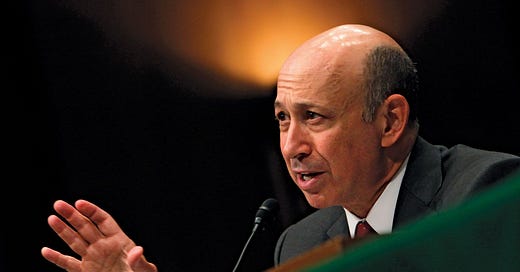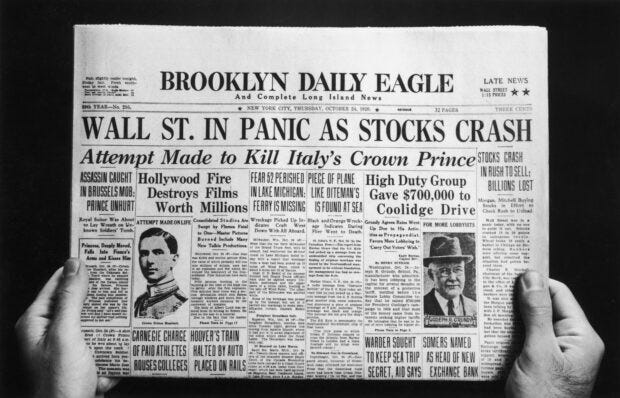🚦 The 2007-2008 Global Financial Crisis
How the housing bubble triggered a global economic collapse
💡 New on Macro Mornings? Start here
🚦 This is part of a 52-week series on Macro Mistakes - Designed for those who want to learn from history.
🧠 7 TOP READINGS - May 2025 Macro Intelligence Report
👉 The complete PDF edition with insider macro strategy - grab it now for just $23.
May 1, 2025 - First Negative GDP Since 2022
May 3, 2025 - $2 Trillion Safety Net Just Vanished
May 6, 2025 - Why the Next Big Global Shift Could Start Now
May 11, 2025 - The Illusion of Calm
May 15, 2025 - When Smart Money Panics
May 20, 2025 - The Rally No One Understands
May 22, 2025 - The Illusion of Safety
Dear all,
In today’s edition of "Macro Mistakes," we revisit the Global Financial Crisis of 2007-2008, one of the most devastating economic collapses since the Great Depression.
This crisis, triggered by the bursting of the housing bubble and fueled by excessive leverage and complex financial products, offers valuable lessons about systemic risk and the dangers of ignoring macroeconomic imbalances.
✍ The Story
In the early 2000s, the U.S. housing market was booming.
Home prices soared as low interest rates and relaxed lending standards made mortgages easily accessible, even for borrowers with poor credit histories.
These subprime mortgages were bundled into mortgage-backed securities (MBS) and sold to investors worldwide, spreading the risk throughout the financial system.
As long as home prices kept rising, everything seemed fine.
But by 2006, housing prices began to fall, and subprime borrowers started defaulting on their loans.
The value of MBS plummeted, and financial institutions holding large amounts of these securities faced massive losses.
By 2008, Lehman Brothers collapsed, triggering a global financial panic.
The Global Financial Crisis led to a severe economic downturn, with stock markets crashing, unemployment soaring, and governments around the world implementing unprecedented bailout measures to prevent a total collapse of the financial system.
❌🚫 The Macro Mistake
The Global Financial Crisis was the result of several critical macro mistakes, including excessive risk-taking, overleveraging, and a failure to address macroeconomic imbalances:
Excessive leverage: Many financial institutions were highly leveraged, borrowing heavily to invest in risky assets like MBS. When the housing market collapsed, these institutions were left with massive losses and no way to cover their obligations.
Complex financial products: The widespread use of MBS and other derivatives obscured the true level of risk in the financial system. Investors and regulators alike failed to understand the potential for these products to cause systemic instability.
Ignoring macroeconomic imbalances: The housing bubble was fueled by cheap credit and lax lending standards, creating significant imbalances in the economy. When these imbalances finally corrected, the result was a severe economic collapse.
👨🎓 The Macro Lesson
The Global Financial Crisis provides several important macroeconomic lessons:
Leverage magnifies risk: Excessive leverage can amplify both gains and losses. When financial institutions become too leveraged, even small losses can lead to insolvency and systemic risk.
Complexity can obscure risk: Financial products like MBS and collateralized debt obligations (CDOs) can hide the true level of risk in the system. It’s essential to fully understand the risks associated with complex financial products before investing.
Macroeconomic imbalances matter: Ignoring macroeconomic imbalances, such as rising debt levels or asset bubbles, can lead to severe economic consequences. It’s important to monitor these imbalances and address them before they trigger a crisis.
The Global Financial Crisis led to a worldwide recession, with millions of people losing their homes and jobs.
In response, governments and central banks implemented massive stimulus packages, including the Troubled Asset Relief Program (TARP) in the U.S. and quantitative easing by the Federal Reserve.
While the global economy eventually recovered, the crisis exposed deep flaws in the financial system and led to significant regulatory reforms, including the Dodd-Frank Act, which aimed to increase transparency and reduce systemic risk.
🔒 Macro Bonus
Investors who recognized the risks of excessive leverage and macroeconomic imbalances were able to protect their portfolios from the worst of the crisis.
Additionally, those who understood the potential for systemic risk in the financial system were better positioned to navigate the downturn.
The lessons from the Global Financial Crisis are still relevant, particularly in periods of rapid asset price growth or rising leverage.
The Global Financial Crisis serves as a powerful reminder of the dangers of excessive leverage, complex financial products, and macroeconomic imbalances.
Next time, we’ll explore another key macro mistake: The 1973 Oil Crisis and how a geopolitical shock reshaped global economies.
Alessandro
Founder of Macro Mornings
⭐️⭐️⭐️⭐️⭐️
What You’ll Get by Joining Macro Mornings Premium
🔸 Regular deep dives into economic indicators and geopolitical developments shaping today’s markets.
🔸 Exclusive, high-quality macro investment opportunities that focus on long-term growth, diversified risk, and the potential to outperform during various economic cycles.
🎁 Exclusive Offer: 30% OFF for Life!
Becoming a Macro Investor Premium, You’ll Gain Access to:
Well-researched insights help you make smarter and more informed decisions .
All the tools you need right at your fingertips to build, track, and grow a resilient portfolio - helping you retire earlier and live life on your own terms.
Stop guessing, start investing with confidence, and enjoy a life free from financial constraints.
👋 Read my Financial Story
✍ FREE
📚 Get your E-book FREE 👉 10 Simplified Strategies for Investors
🎁 Get your Mentorship FREE here
🏆 PRO
🔏 Become a Macro Investor here | 💰 30% Off for Life - [🔥 Only 6 Spots Left! 🔥]
🔑 Get your Mentorship PRO here
📚 The Art of Financial Freedom 👉 51 Macro Lessons to Success Your Future
💻 SOCIAL
🎙 PODCAST
🙏 YOUR VOICE MATTERS - Help me
📝 TrustPilot - Leave a review and share your experience - I’d be truly grateful!
📣 Feedback Form - Help me improve Macro Mornings by sharing suggestions!
Disclosure
This material is not intended as an offer or solicitation for the purchase or sale of any financial instrument. This material has been prepared for informational purposes only. Any forecasts contained herein are for illustrative purposes only and are not to be relied upon as advice or interpreted as a recommendation.






